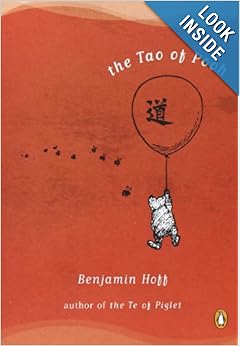Some publications, presentations, and observations of the world around us.
Also available on Research Gate & Google Scholar.
The Tao of Blue
Posted on Feb 18th, 2014
 (Adapted from The Tao of Pooh, by Benjamin Hoffman)
(Adapted from The Tao of Pooh, by Benjamin Hoffman)
"We were discussing the definition of wisdom late one night, and we were just about to fall asleep from it all when Blue remarked that his understanding of Taoist principles had been passed down to him from certain Ancient Ancestors.
"Like who? " I asked.
"Like Blue Tao-tse, the famous Chinese painter," Blue said.
"That's Wu Tao-tse. "
"Or how about Li Blue, the famous Taoist poet? " Blue asked cautiously.
"You mean Li Po," I said.
"Oh," said Blue, looking down at his feet.
Then I thought of something. "That doesn't really matter, anyway," I said, "because one of the most important principles of Taoism was named after you. "
"Really? " Blue asked, looking more hopeful.
"Of course - B'u, the Uncarved Block. "
"I'd forgotten," said Blue.
So here we are, about to try to explain B'u, the Uncarved Block. In the classic Taoist manner, we won't try too hard or explain too much, because that would only Confuse things, and because it would leave the impression that it was all only an intellectual idea that could be left on the intellectual level and ignored. Then you could say, "Well, this idea is all very nice, but what does it amount to? " So instead, we will try to show what it amounts to, in various ways.
B'u, by the way, is pronounced sort of like Blue, but without so much oo - like the sound you make when blowing a fly off your arm on a hot summer day.
Before we bring our Resident Expert in for a few illuminating remarks, let's explain something.
The essence of the principle of the Uncarved Block is that things in their original simplicity contain their own natural power, power that is easily spoiled and lost when that simplicity is changed.
For the written character B'u, the typical Chinese dictionary will give a definition of "natural, simple, plain, honest. " B'u is composed of two separate characters combined: the first, the "radical" or root-meaning one, is that for tree or wood; the second, the "phonetic" or sound-giving one, is the character for dense growth or thicket. So from "tree in a thicket" or "wood not cut" comes the meaning of "things in their natural state" - what is generally represented in English versions of Taoist writing as the "uncarved block. "
This basic Taoist principle applies not only to things in their natural beauty and function, but to people as well. Or Waters. Which brings us to Blue, the very Epitome of the Uncarved Block. As an illustration of the principle, he may appear a bit too simple at times . . . . .
... but, no matter how he may seem to others, especially to those fooled by appearances, Blue, the Uncarved Block, is able to accomplish what he does because he is simpleminded. As any old Taoist walking out of the woods can tell you, simpleminded does not necessarily mean stupid. It's rather significant that the Taoist ideal is that of the still, calm, reflecting "mirror-mind" of the Uncarved Block."
...
"An Empty sort of mind is valuable for finding pearls and tails and things because it can see what's in front of it. An Overstuffed mind is unable to. While the Clear mind listens to a bird singing, the Stuffed-Full-of-Knowledge-and-Cleverness mind wonders what kind of bird is singing. The more Stuffed Up it is, the less it can hear through its own ears and see through its own eyes. Knowledge and Cleverness tend to concern themselves with wrong sorts of things, and a mind confused by Knowledge,Cleverness and Abstract Ideas tends to go chasing off after things that don't matter, or that don't even exist, instead of seeing, appreciating, and making use of what is right in front of it.
Let's consider Emptiness in general for a moment. What is it about a Taoist landscape painting that seems so refreshing to so many different kinds of people? The Emptiness, the space that's not filled in. What is it about fresh snow, clean air, pure water? Or good music? As Claude Debussy expressed it, "Music is the space between notes."
… Many people are afraid of Emptiness, however, because it reminds them of Loneliness. Everything has to be filled in, it seems – appointment books, hillsides, vacant lots – but when all the spaces are filled, the Loneliness really begins. Then the Groups are joined, the Classes are signed up for, and the Gift-to-Yourself items are bought. When the Loneliness starts creeping in the door, the Television Set is turned on to make it go away. But it doesn't go away. So some of us do instead, and after discarding the emptiness of the Big Congested Mess, we discover the fullness of Nothing" (Hoff, 1982, p. 146-147).
...
This emptiness becomes filled with creative disequilbrium and is what I call Blue Mind.
To post a comment, please login.
View this profile on InstagramDr. Wallace J. Nichols (@wallacejnichols) • Instagram photos and videos
What's New
Rochester Women's Magazine
If You Want To Heal, Find Water
Where did our water come from? One theory is from comets and asteroids nearly 4 billion years... continue
New Trader U
The Science Behind The Ocean's Effect On Our Brain
The ocean has long been a source of fascination and wonder for humans. Its vast expanse, rhythmic waves... continue
Red Bull: Understanding the Blue Mind Theory: How water influences our well-being
Read ahead to learn all about this potential mind-body-water connection.
Red Bull surfer Kai Lenny will take any chance he can get to spend time in the sea. &ldquo... continue
